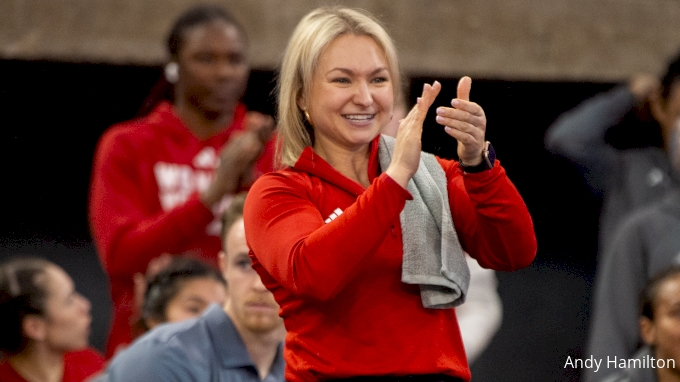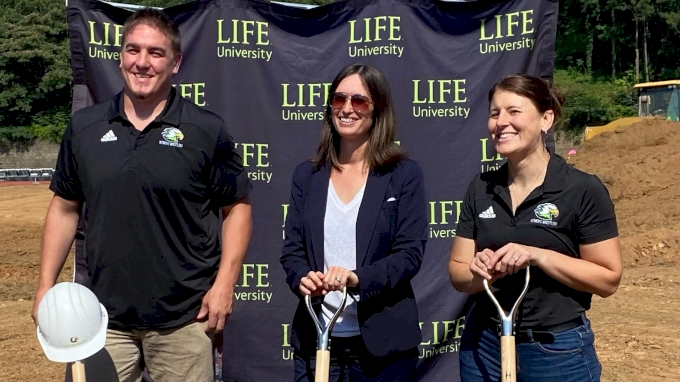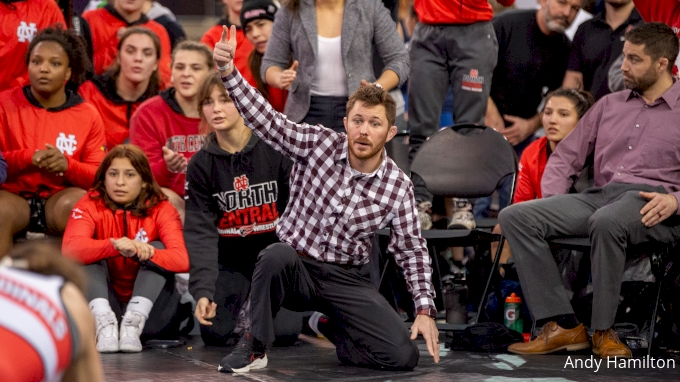Women's College Wrestling Coaches Get More Done With Less
Women's College Wrestling Coaches Get More Done With Less
Most women's college programs have one head coach and, if they're lucky, a low-paid assistant.

Circumstances weren’t ideal for Sacred Heart’s Paulina Biega to start the 2023-24 season. Her assistant resigned and Beiga was faced with coaching the team alone.
Her team wasn’t small, either. Sacred Heart, one of four Division I women’s wrestling programs, was in its third year. Biega led her team to a seventh-place finish at the 2023 National Collegiate Women’s Wrestling Championships and was named coach of the year by her peers, then finished sixth in 2024 when she coached alone.
Biega empowered team captains to make crucial decisions as she navigated a season without support staff where necessity became a development tool. Female wrestlers got a behind-the-scenes look at what it takes to be a leader.
At nationals, in particular, athletes would sit in the corner while Biega was coaching on another mat.
“It was definitely hard,” Biega said. “The moment I found out my assistant wasn’t coming back I told myself that I would not let that affect my year and I’m going to be as strong as I can for the girls.
“I told them that we are going to do it. We are just fine. We are a strong bunch of women and we are going to do it no matter what. I believed in that the entire year and I believed in myself. I kept looking but I couldn’t find the right person.
“It felt like I needed a few more of me but I also engaged my team captains and it showed them how difficult the coaching side is and how many decisions you have to make and what kind of decisions and what things you consider when you make those decisions.”

Sacred Heart's Paulina Biega coached alone during the 2023-24 season.
A King And His Court
The University of Iowa — the lone Power Five women’s wrestling program — is one of two teams with a full-time head coach and two full-time paid assistants. Campbellsville University, an NAIA program led by Lee Miracle, fought for 10 years for two full-time paid assistants, which he currently has.
The remaining programs face the reality of coaching alone or, at best, with a low-paid assistant.
Assistant coaching salaries range from $20 to $30 thousand a year. King University in Bristol, Tennessee — the most consistent and successful women’s college program — is led by Jason Moorman and, recently, a rotating assistant.
A King assistant will coach during the day and work a second job at night. Serving, waiting tables, bar-tending, or DoorDash are common themes.
“It’s an investment on their part,” Moorman said. “Their career is an investment. They have to do a lot of investing daily. I want to make sure I’m investing in them — not only in their wrestling but life in general.
“When I started here as an assistant (men’s coach) I was making $24,000 and I was driving 70 miles a day one way. I just wanted to coach and I took it. When I was hired as the head women’s and men’s assistant coach I was making $34,000.
“I’m fortunate to have student-athletes that buy in and have great character. That goes a long way. If you don’t have people buying in it makes a rough road. I’m thankful for that. That’s probably one of the biggest things that helped me.”
The King Of Consistency: Jason Moorman's National Championship Results
Happy Life, Happy Wife
To be clear, this is not specific to women’s college wrestling. Many athletic programs face this reality, and some only hire a part-time head coach.
Most women’s wrestling teams are NAIA, NCAA Division II, or III — enrollment-driven institutions with varying degrees of investment in athletics.
Life University athletic director Jayme Pendergast faces the same issue with all sports. The Marietta, Georgia-based NAIA school offers 19 men’s and women’s programs, including men’s and women’s wrestling.
She wants more women to assume coaching roles but understands that it could be a multi-year process with a small yearly stipend. Institutional creativity might be an answer with a qualified candidate assuming two roles at the university to earn a livable wage.

Christian and Ashley Flavin with Life University athletic director Jayme Pendergast (middle)
“I wish I had a solution,” Pendergast said. “From my perspective, that’s the push and pull. Playing middle man between knowing how important those assistant coaching roles are to the success of the program and understanding the need for your athletic teams to bring in revenue to the institution to keep costs down. It’s a tough balance and there’s a reality there.
“Our women’s wrestling program brings in revenue to the institution because when you add up their operating budget, salary, benefits, and various other costs we still bring in enough kids that bring in enough revenue to cover those expenses. That’s the main business model we have at a small school.
“The hard part for us is selling the president on a full-time assistant. It’s hard to get someone young and pay them next to nothing and have them rotate every year. They don’t quite feel that burden like a head coach feels.”
Life University’s women’s program is at or near the top thanks to a unique coaching situation. Ashley Flavin leads the team with her husband, Christian, as an assistant. The two were hired together during the 2018 season and the consistency shows.
All income goes to one family, and a staff meeting is an arm-length away — at home or the office. Christian would likely be a head coach somewhere else, but this provides a long-term solution to a rotating assistant.
Flavins For Life: Ashley and Christian's Coaching Tenure
Birds Of A Teather Flock Together
North Central College — a Division III program in Naperville, Illinois — won the 2023 National Collegiate Women’s Wrestling Championships and finished second to Iowa in 2024 by six points.
Joe Norton has two jobs: head women’s coach and assistant men’s. That role will increase now that Grant Zamin, 26, was hired as the new men’s head coach. Norton will assume a mentorship role as he navigates two programs.
His formula is simple in theory but difficult to execute: a full-time, unwavering commitment to the athletes.
“Kendra (Ryan) just did a camp and she’s telling me about her camp and YeLe (Aycock) is telling me about her internship,” Norton said. “I’m here all the time so I’m having those conversations all the time. I know Kendra Ryan and YeLe Aycock like the back of my hand.
“I believe I can coach them better than the guy who’s not in the office every day or being around the athlete as much. I know them and I built a relationship with them. I can coach them really, really hard because I’ve earned that with them. I think a lot of coaches think they get to coach them hard and yell at them because ‘I’m your coach and you’re my athlete so you have to listen.’
“You have to earn that. Continuity and knowing what you’re getting out of your coaches every day is huge.”
Continuity is the operative word. Several current assistants like Simpson’s Emma Cochran and Texas Woman’s Erin Golston are promising future head coaches.
Development takes time. And, at this point, taking less now for the hope of something bigger — and more meaningful — later.

Joe Norton at the 2024 NWCA National Duals